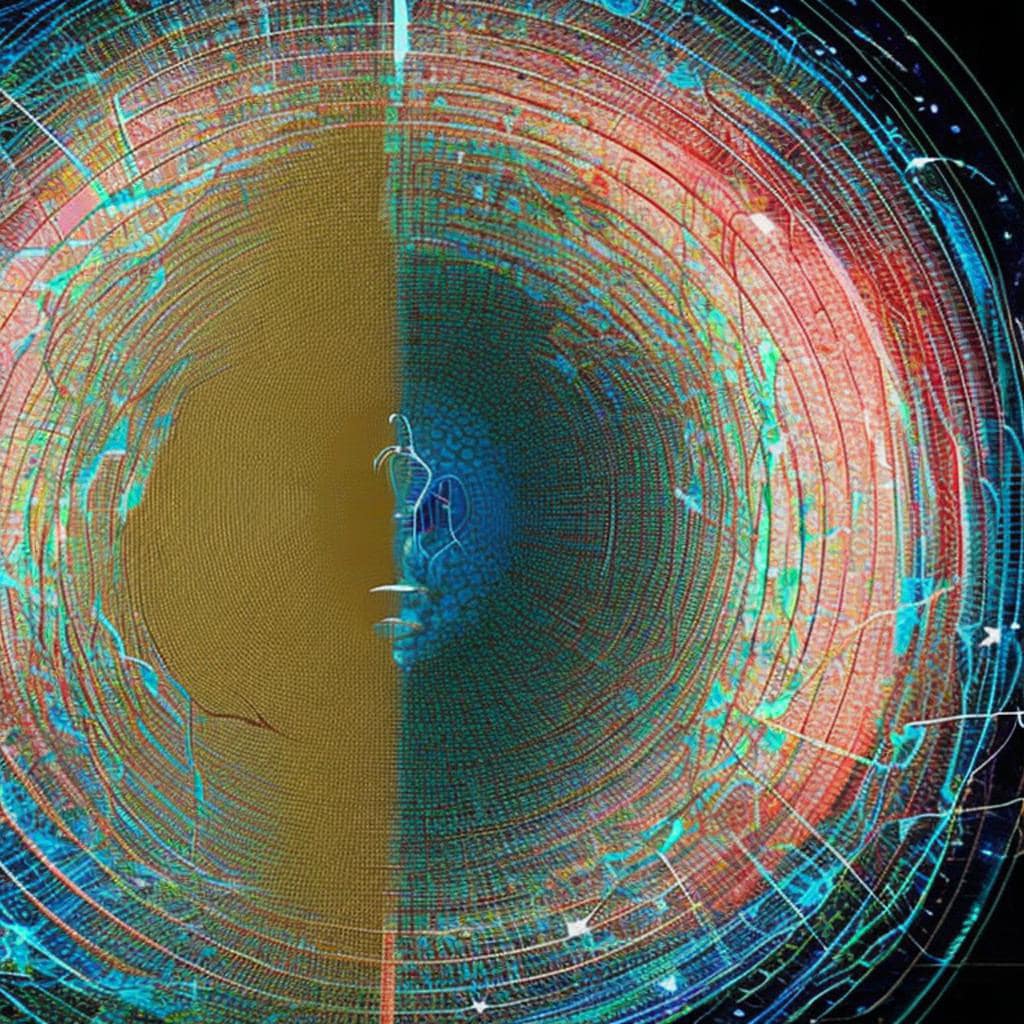Implications for our understanding of reality
Quantum mechanics is a fundamental theory of physics that describes the behavior of particles and systems at the microscopic level. It has revolutionized our understanding of the physical world, and has led to many important discoveries and technological advances. However, the relationship between quantum mechanics and consciousness is a topic of ongoing debate and discussion.
One question that has emerged in recent years is whether consciousness plays a fundamental role in quantum mechanics. Some researchers have proposed that consciousness may be necessary to collapse the wave function of particles, which is a key feature of quantum mechanics. Others argue that such an idea is not testable and falls outside the realm of scientific inquiry.
Another question that has emerged is whether the principles of quantum mechanics can help us to understand the nature of consciousness itself. Some researchers have proposed that consciousness may be a fundamental aspect of reality, and that the principles of quantum mechanics can help to explain its behavior.
While these questions are still being debated, they have the potential to lead to new insights and discoveries about the nature of reality and our place in it. In this blog post, we will explore these questions in more detail, and examine the potential implications for our understanding of consciousness and the physical world.
The Relationship Between Consciousness and Quantum Mechanics
The idea that consciousness may play a fundamental role in quantum mechanics is based on the concept of measurement in quantum mechanics. In quantum mechanics, the act of measurement can influence the behavior of particles, causing them to collapse into a definite state. However, the act of measurement is also a subjective process that depends on the observer.
Some researchers have proposed that consciousness may be necessary to collapse the wave function of particles, and that this process may be responsible for the subjective experience of consciousness itself. This idea has been called the “consciousness causes collapse” interpretation of quantum mechanics.
However, this idea is controversial, and many physicists and philosophers argue that it is not testable and falls outside the realm of scientific inquiry. They argue that consciousness is a subjective experience that cannot be objectively measured or observed, and that the principles of quantum mechanics are independent of human consciousness.
The Nature of Consciousness
While the relationship between consciousness and quantum mechanics is still an area of active research and debate, the principles of quantum mechanics can provide insights into the nature of consciousness itself. Some researchers have proposed that consciousness may be a fundamental aspect of reality, and that the principles of quantum mechanics can help to explain its behavior.
One idea is that consciousness may be a manifestation of quantum entanglement, which is a phenomenon in which particles become correlated in such a way that the state of one particle is dependent on the state of another. Some researchers have proposed that consciousness may be a form of global entanglement, in which the state of consciousness is dependent on the state of the entire universe.
Another idea is that consciousness may be a manifestation of the observer effect in quantum mechanics. The observer effect is the idea that the act of measurement can influence the behavior of particles, and some researchers have proposed that consciousness may be necessary to collapse the wave function of particles and bring about the observer effect.
While these ideas are still speculative, they have the potential to lead to new insights and discoveries about the nature of consciousness and the physical world. The study of consciousness is an active area of research, and the principles of quantum mechanics may provide a useful framework for understanding its behavior.
Implications for Our Understanding of Reality
The relationship between consciousness and quantum mechanics has the potential to revolutionize our understanding of reality. If consciousness does play a fundamental role in quantum mechanics, it would suggest that the physical world is intimately connected to our subjective experience of it.
Additionally, if consciousness is a fundamental aspect of reality, it would suggest that the physical world is not purely objective and independent of the observer. This would challenge our traditional understanding of the nature of reality and would have significant implications for philosophy, psychology, and other fields.
Furthermore, if the principles of quantum mechanics can help us to understand the nature of consciousness itself, it would suggest that the study of consciousness is not just the domain of psychology and neuroscience, but also of physics and other natural sciences. This interdisciplinary approach to understanding consciousness could lead to new discoveries and insights about the nature of the universe and our place in it.
However, it is important to note that the relationship between consciousness and quantum mechanics is still an area of active research and debate, and there is much that remains to be understood about the fundamental nature of reality. While these questions may challenge our traditional understanding of the physical world and consciousness, it is through this kind of questioning and exploration that we can make new discoveries and advance our understanding of the world around us.
Conclusion
The relationship between consciousness and quantum mechanics is a fascinating topic that has the potential to revolutionize our understanding of the physical world and our place in it. While the relationship between these two fields is still a subject of debate and speculation, the principles of quantum mechanics can provide insights into the nature of consciousness and the physical world.
As we continue to explore these questions, it is important to maintain a spirit of curiosity and inquiry, and to remain open to new discoveries and ideas. It is through this kind of exploration and questioning that we can deepen our understanding of the world and ourselves, and make new discoveries about the fundamental nature of reality.
Table summarizing the potential implications for our understanding of reality that may arise from the study of the relationship between consciousness and quantum mechanics
| Implication | Description |
| Consciousness as a fundamental aspect of reality | If consciousness is a fundamental aspect of reality, it would challenge our traditional understanding of the nature of reality and would have significant implications for philosophy, psychology, and other fields. |
| The physical world is intimately connected to our subjective experience of it | If consciousness plays a fundamental role in quantum mechanics, it would suggest that the physical world is not purely objective and independent of the observer. |
| Interdisciplinary approach to understanding consciousness | If the principles of quantum mechanics can help us to understand the nature of consciousness itself, it would suggest that the study of consciousness is not just the domain of psychology and neuroscience, but also of physics and other natural sciences. |
| Revolutionize our understanding of reality | The relationship between consciousness and quantum mechanics has the potential to revolutionize our understanding of reality, and could lead to new discoveries and insights about the nature of the universe and our place in it. |
These are just a few of the potential implications that may arise from the study of the relationship between consciousness and quantum mechanics. It is a fascinating topic that has the potential to lead to new insights and discoveries about the fundamental nature of reality.
Researchers who have contributed to the study of the relationship between consciousness and quantum mechanics
- Roger Penrose – a British physicist and mathematician who has proposed that consciousness is related to quantum mechanics through the concept of “orchestrated objective reduction” (Orch OR), which suggests that consciousness is a fundamental aspect of reality and is responsible for the collapse of the wave function in quantum mechanics.
- Stuart Hameroff – an American anesthesiologist and professor who has worked with Penrose on the Orch OR theory, and has proposed that consciousness arises from the microtubules in the brain, which are thought to exhibit quantum behavior.
- Henry Stapp – an American physicist who has proposed that consciousness is a fundamental aspect of reality, and that the observer plays a key role in quantum mechanics through the act of measurement.
- David Chalmers – an Australian philosopher who has proposed the idea of “panpsychism”, which suggests that consciousness is a fundamental aspect of the universe and is present in all matter.
- Anton Zeilinger – an Austrian physicist who has conducted research on the principles of quantum mechanics, and has proposed that quantum mechanics can provide insights into the nature of consciousness.
- Dean Radin – an American parapsychologist who has conducted research on the relationship between consciousness and quantum mechanics, and has proposed that consciousness can influence the behavior of particles in quantum mechanics.
- Max Tegmark – a Swedish-American physicist who has proposed the idea of “consciousness as a state of matter”, which suggests that consciousness can be understood in terms of the physical properties of matter.
These are just a few of the many researchers who have contributed to the study of the relationship between consciousness and quantum mechanics, and the list is by no means exhaustive. The study of consciousness and quantum mechanics is an active area of research, and new insights and discoveries are being made all the time.
Researchers and their contributions to the study of the relationship between consciousness and quantum mechanics
| Researcher | Contribution |
| Roger Penrose | Proposed the “orchestrated objective reduction” (Orch OR) theory, which suggests that consciousness is a fundamental aspect of reality and is responsible for the collapse of the wave function in quantum mechanics. |
| Stuart Hameroff | Worked with Penrose on the Orch OR theory, and has proposed that consciousness arises from the microtubules in the brain, which are thought to exhibit quantum behavior. |
| Henry Stapp | Proposed that consciousness is a fundamental aspect of reality, and that the observer plays a key role in quantum mechanics through the act of measurement. |
| David Chalmers | Proposed the idea of “panpsychism”, which suggests that consciousness is a fundamental aspect of the universe and is present in all matter. |
| Anton Zeilinger | Conducted research on the principles of quantum mechanics, and has proposed that quantum mechanics can provide insights into the nature of consciousness. |
| Dean Radin | Conducted research on the relationship between consciousness and quantum mechanics, and has proposed that consciousness can influence the behavior of particles in quantum mechanics. |
| Max Tegmark | Proposed the idea of “consciousness as a state of matter”, which suggests that consciousness can be understood in terms of the physical properties of matter. |

Thank you for questions, shares and comments!
Share your thoughts or questions in the comments below!






